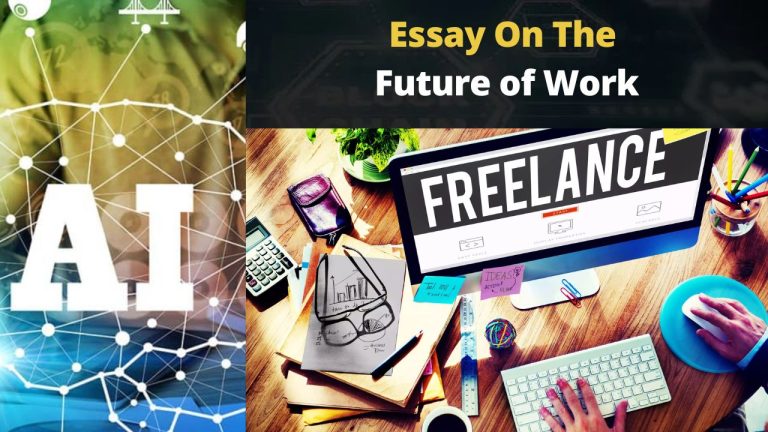"Advertisement"
Essay On The Future of Work
Hello My Dear Friend, In this post “Essay On The Future of Work“, We will be going to read about the Future of Work as an Essay in detail. So…
Let’s Start…
Essay On The Future of Work
Introduction
Due to changes in society, economic conditions, and technological development, the idea of work has undergone amazing change over time.
Examining what the future holds for the workplace is crucial as we stand at the edge of the future.
We will delve into the many dimensions of the future of work in this in-depth investigation, taking into account the influence of automation, remote employment, and the skills that will be in demand.
1. Automation and Artificial Intelligence (AI)
Automation and artificial intelligence are at the center of one of the most important conversations about the future of employment.
We have seen how numerous industries have incorporated machines and algorithms over the last few decades, changing the nature of work itself.
While some people worry about losing their jobs, others see a chance for work augmentation rather than replacement.
The potential for automation to replace mundane, repetitive jobs will free up human workers to work on more innovative, intricate, and strategic projects.
In this case, working involves more managing and interacting with intelligent systems rather than doing manual labor.
Additionally, a new workforce with skills in AI ethics, programming, and machine learning will be needed for the creation and upkeep of these AI systems.
2. Remote Work and the Digital Workspace
The COVID-19 epidemic has radically changed how and where work is done and hastened the acceptance of remote work.
The concept of a mobile, digital workstation appears to be more and more connected to the future of work.
Employers are becoming aware of the advantages of remote work, including lower overhead expenses and access to a worldwide talent pool.
The difficulty is in maintaining productive, inclusive, and work-life balance-friendly remote work. Investments by businesses are being made in the technologies and platforms that provide smooth remote collaboration.
In the future, on-site and remote work may coexist, giving employees more autonomy over their schedules and working conditions.
3. Skillsets for the Future
The abilities necessary to succeed in the job market evolve along with the type of work. To be competitive, the workforce of the future will need to adapt and pick up a variety of skills.
The following critical competencies will be in great demand:
a. Digital Literacy:
Knowledge of digital platforms and tools will be required for nearly every employment.
b. Adaptability:
the capacity to adapt swiftly as new technology and working procedures emerge.
c. Emotional Intelligence:
Human abilities like empathy and excellent communication will continue to be important.
d. Data Literacy:
Understanding and using data to make decisions and solve problems.
e. Critical Thinking:
The capacity to analyze information critically and make informed judgments.
f. Creativity:
Given that it is less likely to be automated, creative thinking will be prized.
g. Cybersecurity:
Cybersecurity skills will be in high demand due to the growing digitalization of the workforce.
4. Gig Economy and Freelancing
For years, the gig economy has been expanding, and there are no signs that it will stop. Short-term contracts and freelancing give employees flexibility and the chance to broaden their skill sets.
The traditional employer-employee relationship may change as a result of this transition, demanding new labor laws and social safety nets to safeguard workers’ rights.
5. Lifelong Learning
Learning will no longer be limited to formal schooling in the world of business. It will be required to continually reskill and upskill in order to be relevant in the labor market.
Employers will invest in training programs and online resources that support continued education, making lifelong learning a crucial component of the career path of every worker.
6. Inclusivity and Diversity
Inclusion and diversity must be prioritized in the workplace of the future. Diverse perspectives and skills are combined by a diverse workforce, which promotes innovation and creativity.
Employers must foster inclusive workplaces where workers from all backgrounds are respected and welcomed.
7. Environmental Sustainability
In the coming years, sustainability will become more and more important in the workplace. Businesses will need to embrace environmentally friendly practices and think about how their operations will affect the environment.
Jobs centered on sustainability and conservation will grow in importance as a source of employment.
Conclusion
Work in the future will present both opportunities and problems. It’s essential to continue being adaptable, inquisitive, and open to change as we negotiate the changing landscape of automation, remote work, and increasing skill demands.
The future of work is a blank canvas on which we may paint our vision of a more diverse, sustainable, and creative workplace.
We can create a future where work is a tool for individual and societal improvement rather than just a means to an end by embracing the revolutionary power of technology and emphasizing the welfare of the workforce.
Finally, Thanks For Reading “Essay On The Future of Work“.
If you have any questions related to “Essay On The Future of Work“, So, please comment below.
Must Read:
